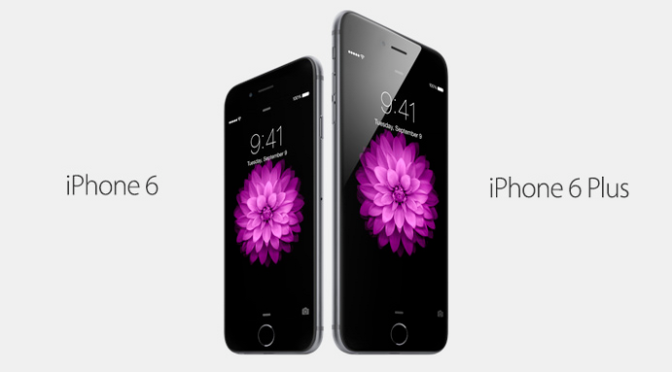Last week, as throngs of people stood in line at the Apple store, Courtenay and I walked up to our cell phone provider’s mall kiosk just a little further down and asked if they had any iPhone 6s left. A short while later, we had traded our old iPhones for the shiny new ones of our choice.
 When we had tried the apple store earlier, it was so busy that we could hardly get close enough to a display model to see one. At the cellphone kiosk, we were given demo models to hold and play with. While you had to make appointments to receive service at Apple, walk-ins were welcome at the cellphone kiosk. Shipping problems meant pre-orders were delayed and backlogged at the Apple store. The cellphone kiosk? We were the first customers to buy the new iPhones from our sales associate, and it was the middle of the afternoon already. And my wife and I loved buying our phones from the friendly guy at the mall kiosk.
When we had tried the apple store earlier, it was so busy that we could hardly get close enough to a display model to see one. At the cellphone kiosk, we were given demo models to hold and play with. While you had to make appointments to receive service at Apple, walk-ins were welcome at the cellphone kiosk. Shipping problems meant pre-orders were delayed and backlogged at the Apple store. The cellphone kiosk? We were the first customers to buy the new iPhones from our sales associate, and it was the middle of the afternoon already. And my wife and I loved buying our phones from the friendly guy at the mall kiosk.
It was somewhat of a surreal experience to be quietly buying new phones just down the way from the clamour of the Apple store.
As we experienced the release day chaos first hand, it dawned on me that churches could learn something from all of this. We wish we could all be Apple stores, with the throngs of people, not unlike the mega-church, but most of us are more like the small cell phone kiosks. We offer the same thing as the mega-churches, but most people don’t know we have it.
As a pastor of mainline denomination in Canada, my 5 years of ministry experience has been serving in a denomination in decline. There are a zillion factors for this, of course: changing social norms, less and less societal evangelization on behalf of the church, new census categories that actually allowed people to choose “none” or “other” in the religion category, less immigration from countries with people that are mainline adherents, a failure to evangelize our own children over the past 5 decades, judgemental and condemning attitudes by church leaders towards pretty much everything new in the world and so on.
I often remind my people that while we are partly to blame for our own decline, a lot of it is simply out of our control.
Yet, in the midst of this decline, many Christian mainliners are concerned about getting people back to church, about returning to a time of full pews and overflowing offering plates (I am not sure this ever existed).
People often point to the other choices that people seem to be making instead of church on Sunday mornings as the thing to blame for shrinking membership roles. Sports, dance, music, shopping. Mega-churches, Evangelicals, praise bands.
These are the things that people want, or so I am told.
We need to be flashier, more engaging, more interesting, less old, less traditional, less churchy.
And yet, my own anecdotal experience tells me that my current high church liturgical predilections are “attracting” or “not attracting” just as many people as the young adult praise and worship band that I played in for years. Lutherans are coming in fewer numbers to Lutheran churches. Other mainliners, Roman Catholics, Evangelicals and new converts are also coming in fewer numbers to Lutheran churches. Apparently fewer people are attending church across the board.
I am not the first to say these things, you have probably heard them before.
But back to iPhone 6 release day… with the pandemonium of people lined up for hours, days even, to get their new Apple products, I wondered why all these people are here for this stuff.
And it dawned on me.
They are buying something. Apple is selling something.
 Apple is great at selling things. My cell phone provider, while strong in most of Canada, has yet to get a foothold in this province. Mainline decline is a loss of a foothold. Whatever we were selling, people aren’t buying anymore.
Apple is great at selling things. My cell phone provider, while strong in most of Canada, has yet to get a foothold in this province. Mainline decline is a loss of a foothold. Whatever we were selling, people aren’t buying anymore.
More importantly, people are attracted by things to buy, consume, attain, acquire. They want something new, flashy, entertaining.
Lutherans, with other mainline Christians, are just not selling what the people want.
This is a good thing.
As I realized that my church isn’t selling what people want, unlike Apple or sports or movie theatres or shopping malls, I also realized that we don’t want to sell something.
The churches that do sell what people want, are peddling things that I would never offer my people.

Years ago, when mainline churches were on the top of the heap they weren’t more holy or gospel filled places. What we did was sold the only show in town on Sunday mornings, we sold social networking the old-fashioned way, we sold black and white morality, we sold plenty of judgement and we sold cheap access to heaven (for only 1 hour of time a week on Sunday mornings).

Today, lots of churches are selling the same kind of stuff: A privileged place in God’s kingdom, the promise of wealth and success, black and white answers, us vs. them morality, security in a dangerous world, entertaining worship, vanilla lattes in the narthex, music like you hear on top 40 radio, and cheap access to heaven (for only a sincerely held, unquestioning faith).
Now, I am not saying that churches who achieve attendance and budgetary “success” aren’t preaching the gospel, creating disciples or doing good ministry. Yet, I do question attendance as a metric of good ministry, or as a way to determine if the gospel is preached. If numbers really do measure good ministry, than movie theatres and pro sports are doing the best ministry there is. Apple is an evangelistic super star.
Now I have to admit, in my weaker moments I do fret about numbers. I am secretly prideful when my church is packed at Christmas or Easter. I am inwardly disappointed when there is a sparse crowd on cold day in January or a lazy dog day of summer.
Increasingly, however, I am asking more and more “what brings people to church anyways?” While I have been mostly unsure about the answer these days, my experience with the Apple store taught me something about what does draw the crowds.
As individuals, we may be some of the most pious seekers of Christ and spiritual enlightenment there are. But as people, as a mob… we are attracted by a good sales pitch.
And as a Lutheran pastor, I am not selling – not even offering for free – what people want at their basest levels.
People want new, I offer old.
People want flashy, I have steadfast.
People want to be entertained, I point to the One who transforms.
People want easy answers, I have only more questions.
People want security, I can only tear walls down.
People want assurances, I talk about uncertainty/faith.
People want something immediate, I am interested in the eternal.
People want power and control over their world…
I can only talk about how we don’t have it…
And how God does.
And yes, I realize I am may sound like I am rationalizing decline. Maybe I am. But Jesus only had 12 followers, which makes me a ragging success comparatively. I still can’t help but notice that the churches that are drawing the crowds tend to look a lot like Apple product launches. They are selling something to the masses.
And Jesus, my friends, is not for sale. Maybe it is time we stop worrying about numbers, decline, fewer resources and smaller budgets. Maybe the spirit is telling us that God’s church is not for sale.
Maybe Jesus is a little less Steve Jobs, and a little more like that faithful stalwart whose butt imprint has been etched in the pew because church is not about getting something new…
…but about becoming someone new.
Many pastors and congregations just might feel like that small kiosk in the mall, that we all pass by because they look like they are selling cheap crap. We might look longingly at the mega-churches and Apple stores with their throngs.
But good ministry is not selling something. The Gospel is not a sales pitch.
Jesus didn’t command us to fill pews and offering plates. Jesus commanded us to baptize, to eat and drink, to forgive sins.
And those things don’t fill pews or offering plates…
… but they do transform us and the world.
So maybe it is time to stop trying to get more people to church, and just give the gospel to the people we have.
Are we trying to sell God? Are “successful” churches really selling something? Share in the comments, on the Facebook Page: The Millennial Pastor, or on Twitter: @ParkerErik




